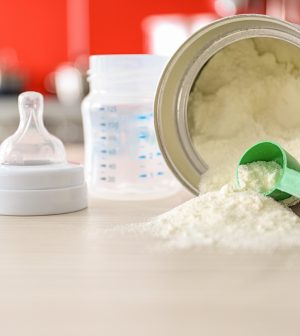- Could Artificial Sweeteners Be Aging the Brain Faster?
- Techniques for Soothing Your Nervous System
- Does the Water in Your House Smell Funny? Here’s Why
- Can a Daily Dose of Apple Cider Vinegar Actually Aid Weight Loss?
- 6 Health Beverages That Can Actually Spike Your Blood Sugar
- Treatment Options for Social Anxiety Disorder
- Understanding the Connection Between Anxiety and Depression
- How Daily Prunes Can Influence Cholesterol and Inflammation
- When to Take B12 for Better Absorption and Energy
- Epsom Salts: Health Benefits and Uses
Why Home-Made Baby Formula Is a Bad Idea

If you’re having trouble finding infant formula for your baby due to the nationwide shortage, do not turn to homemade recipes, an expert warns.
“Even the best intentions can have devastating results,” said Dr. Diane Calello, a pediatrician and director of the New Jersey Poison Control Center based at Rutgers New Jersey Medical School in Newark.
“Although it may seem safe to use substitutes or make homemade formula to feed your baby, it can be very dangerous and potentially life-threatening,” she cautioned in a news release.
The U.S. Centers for Disease Control and Prevention recently reported on three infants who were treated in emergency rooms for low calcium levels and vitamin D-deficient rickets after being fed homemade formula. Infants fed watered-down formula also face the risk of electrolyte imbalance and brain swelling.
Calello outlined what shouldn’t be fed to babies and what formula alternatives are safe.
Rice drinks, goat’s milk, almond milk, cow’s milk, protein shakes and homemade or watered-down formula can quickly lead to severe nutritional deficiency in infants because they lack essential nutrients babies require at each feeding.
She also warned against feeding babies honey.
Honey and products such as graham crackers or cereal that have honey as an ingredient are also nutritionally deficient and may cause a serious type of food poisoning called botulism in children younger than 12 months, Calello said.
If you can’t obtain your baby’s regular formula, speak with your pediatrician to get advice on the safest available options for your baby, especially if your child has special health needs.
Government agencies have offered resources for finding formula, and major media outlets are regularly publishing updates on the status of the crisis.
New guidance from the American Academy of Pediatrics (AAP) suggests checking at smaller stores and drug stores for formula, buying formula online from well-recognized distributors and checking local social media groups dedicated to this issue.
If it’s impossible to find infant formula, toddler formula — while not recommended for infants — can be used for a few days if the infant is close to 12 months old, according to the AAP.
It also says full-term babies can be fed formula made for premature infants for a few weeks if needed. In an absolute emergency, soy milk fortified with protein and calcium may be an option for a few days for babies who are close to a year old. If you use an alternative, be sure to switch back to formula as soon as you can get some, the AAP advises.
The U.S. Food and Drug Administration is considering accelerated approval of some imported formulas, but it is not safe to buy them at the moment.
Many formulas sold in Europe have sufficient nutrients, but they need to be imported under certain safety measures, such as maintaining the correct temperature.
More information
For more on formula feeding, go to the American Academy of Pediatrics.
SOURCES: Rutgers University, news release, May 27, 2022
Source: HealthDay
Copyright © 2026 HealthDay. All rights reserved.










